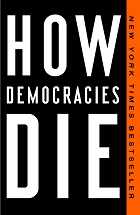Do not manipulate democracy when angry
The message for this week is simple: do not try to change the rules of democracy in times of polarization, because it only makes things worse.
There is a growing chorus among Washington DC politicians that to get things done during a period of deep political polarization you must change the rules of the US Senate. The upper chamber of Congress, they argue, has become gridlocked for years, unable to pass any legislation of substance. In their view, the problem at the core is not a politically divided country. They instead point the finger at the filibuster, a longstanding mechanism in the Senate that allows lawmakers in the minority to hold up or kill legislation they dislike.
This is how the filibuster works. Originally, the filibuster involved a Senator or group of them talking for hours or days nonstop (never leaving for meals or bathroom breaks) to hold up a measure until the other side gave up. These days there is less drama in the process. It only takes a group of senators to signal they will filibuster a piece of legislation to kill it. The only way to get around this challenge is to have 60 senators (out of the total of 100) force the matter to a vote and pass it. Otherwise, a mere 41 senators can still kill a bill. Those who want to do away with the filibuster have several arguments: that it is an outmoded rule (some even call it racist), that it is objectively unfair, and that these days (unlike any other time in history) we have important legislation that simply “cannot wait.”
Killing the filibuster is a shortcut to pass laws. And that is what makes it so dangerous. In politics, business, and life nothing worthwhile comes from shortcuts. Shortcuts lead to populism from the right or the left. Shortcuts undermine institutions. Shortcuts sacrifice quality for expediency. US President Joe Biden recently said he supports going back to “talking filibusters” that force senators to talk nonstop, and suggested even doing away with it if senators continue to abuse the mechanism. Former President Donald Trump also once demanded an end to the filibuster. It seems that the only thing the extremes can agree on these days is that they want to change the rules so they can ram legislation down each other’s throats, given the chance. This can only lead to escalation and more polarization in the future. Changing democracy in times of polarization is like trying to make major travel or life plans during a pandemic – you just don’t do it. You slow down and do as little as possible because whatever else you try to do makes life worse for everybody. In other words, sometimes gridlock can be a good thing.
The German statesman Otto Von Bismarck once said: “Politics is the art of the possible, the attainable – the art of the next best.” What he meant was that politics requires compromise and sacrifice, which are absent in a polarized reality. I was utterly offended the first time I heard this phrase when I was a naïve young man. At the time I thought politics should be the art of making the impossible possible. But unless you live in a dictatorship, making the impossible possible takes years of effort, grassroots work, and gobs of money too. That is just the way it is.
So, what is the solution? Patience and hard work. You must work to successfully change public opinion enough so you have the 60 senators needed to pass life changing legislation. This is also called moving the Overton Window (Google it). The Overton Window, a term coined by political analyst Joseph Overton, is known as the set of policies or ideas that are considered mainstream or acceptable at a given point in time. Those too radical lie outside the window. As you can imagine, moving the widow in either direction is not easy. It also takes (you guessed it) years of effort, grassroots work, and gobs of money. Sorry, there is no silver bullet here.
At any point in time, we will always face some emergency (hunger, inequality, environmental degradation), or some pressing need to act now. But the only things we can truly rely on to keep us sane are time tested rules and institutions.
What I’m (Re) Reading
 In the book How Democracies Die (Broadway Books, 2018), authors Steven Levitsky and Daniel Ziblatt show us how fragile liberal democracy really is and how easily it can, well, die.
In the book How Democracies Die (Broadway Books, 2018), authors Steven Levitsky and Daniel Ziblatt show us how fragile liberal democracy really is and how easily it can, well, die.
The book advances an important point which lies at the core of America’s successful democratic experiment: the need for “mutual tolerance and institutional forbearance.” Both are dangerously absent in America these days. Institutional forbearance in essence involves choosing not to act even though you legally can.
The authors touch on why doing irreversible things during times of polarization is a bad idea. The gist of it is that changing the rules is a slippery slope that leads to escalation. In times of populism from the left or the right, what society needs is both sides gradually compromising with each other. Of course, a polarized society does not see it that way. In times of division people feel like their own vision of change is overdue.
The book’s conclusion anticipates a post-Trump scenario of “institutional warfare” and “democracy without guardrails” which looks like what we are living through today. The book gives us gives a prescient warning: “When partisan rivals become enemies, political competition descends into warfare, and our institutions turn into weapons.”

Incoming link: casino games for real money